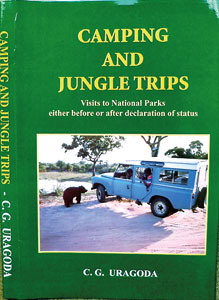The national parks and their denizens
View(s):Book facts | Camping and Jungle trips By Dr. C.G. Uragoda. Reviewed by Jayantha Jayewardene
In his latest book Camping and Jungle Trips –Visits to National Parks either before or after declaration of status, Dr C.G. Uragoda describes, with joy, the many trips that he has made to our national parks since 1953. Dr. Uragoda has written over ten books so far.
Frank Lloyd Wright, the famous architect has said “Study nature, love nature, stay close to nature. It will never fail you”. Being close to nature, studying it and loving it has certainly not failed Dr. Uragoda.

In the 1800s Sri Lanka had an abundance of wildlife. The villagers used to hunt animals like deer, sambur, buffalo, wild boar and smaller mammals for their consumption. Later in the middle of that century, the government found that organised poaching, for meat, antlers and skin, was reducing the numbers of animals steadily. In addition the Britishers, especially the planters, hunted elephants, bear, buffalo, leopard, deer, wild boar and many avian species, for what they called sport.
In order to reduce this wanton destruction of wildlife the government enacted an ‘ Ordinance to prevent the wasteful destruction of buffaloes and game throughout the island’. In 1894 a group of planters formed the Ceylon Game Protection Society. Though their main objective was to assist the government to protect wildlife or game, as it was then called, they also had a selfish motive where they could periodically shoot the game they protected, after obtaining licences from the government.
They established Resident Sportsmen’s Reserves of which Yala and Wilpattu were the first reserves. These are now two of our major national parks. The Department of Wildlife Conservation was established in 1949. Sri Lanka now has 22 national parks.
What comes through when reading Dr Uragoda’s book is his love for the jungles, trekking and camping in these jungles and his close observation of almost everything that goes to make a national park. His notes on trees, plants, animals, birds, crocodiles etc., places of archaeological, historical and Buddhist interest, within these parks are carefully recorded. The various routes that one could take within these parks, which he describes, are also of interest. The book is personalised with interesting anecdotes concerning the different people who have gone camping with him over the years. Initially he had gone camping with someone who had organised the trip but later he had taken over the organisation of these trips.
The book certainly does not cover all aspects of our national parks in detail but is interesting enough to whet one’s appetite for the jungles and its denizens. It also brings out the joys of camping out in the jungles and sleeping under the stars. I thoroughly enjoyed reading this book. My congratulations to Dr. Uragoda on an excellent and very readable book.
There is a serious lack of awareness of the environment and its related issues amongst our decision makers like the administrators, the legal persons and the politicians. This is the main reason for there being a barrier to any creation of conservation awareness amongst our general public.
There is an African proverb that says’ Till the lions have their own historians, tales of hunting will always glorify the hunter’. Our historians, namely environmentalists, have to put across very strongly, to those who make the laws, the crucial need to protect the environment. Till these forces emerge and are effective the environment will decline like the African lions.
A recent film with a jungle theme and a Tarzan like character was advertised with the slogan ‘You can take the man out of the jungle but you cannot take the jungle out of the man’. Dr. Uragoda is one such man.
This book is available at Vijitha Yapa Bookshop and Sarasavi Bookshop at Rs. 1,200 per copy
Follow @timesonlinelk
comments powered by Disqus


